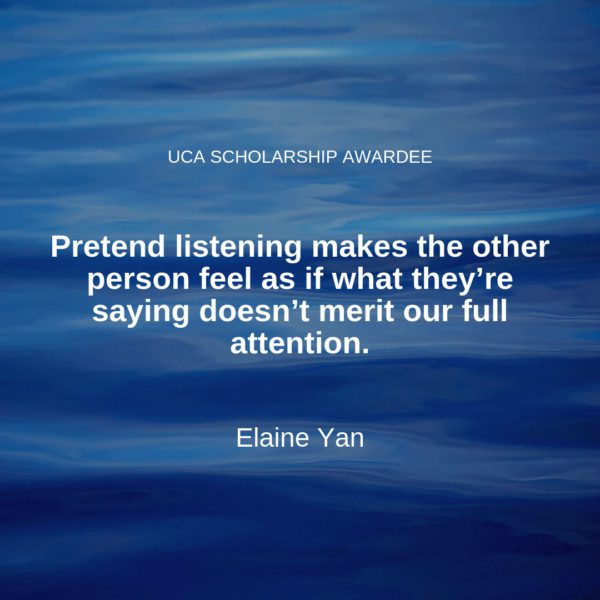 “Mhm.”
“Mhm.”
“Okay.”
“I see.”
I stared at my friend, my words dying on my lips after I realized that she wasn’t really listening to me. She had noticed my uncharacteristically downtrodden expression and asked me herself how I was feeling. Only a few minutes after I had started talking, though, the only responses I received were haphazard one or two word phrases. I left feeling unimportant and very small.
It’s not just that friend, though. It’s my other friends, my family, myself, everyone. We all fall victim to pretend listening, where we act like we’re invested in the conversation by throwing in the occasional vaguely relevant filler response. We’re half-in and half-out, and it becomes apparent that we’re only half-listening. Pretend listening makes the other person feel as if what they’re saying doesn’t merit our full attention.
When I’ve found myself being the pretend listener, I always feel guilty when I realize the other person’s expression. Whether it’s subtle hurt or overt offense, the bad taste in my mouth always lingers. With a metaphorical nod to everyone who’s found themselves on the receiving end of the absentminded “mhm,” if I could change one thing in the world to make it a more caring place, it would be how we listen. I’d encourage everyone to actively listen and pay attention when we converse because it’s so easy to slip into the trap of pretend listening and just focusing on ourselves.
Seeking to understand first naturally strengthens amity. Words hold so much power because we can use them to hurt and heal, condemn or comfort. How we respond to others’ words can begin and carry on that caring impact that we look for.
One time, my best friend had come to me in a panic. It was right before the deadline to commit to a college, and she had found out that her parents had changed their minds on where they were sending her to college. She told me her parents had agreed to send her to her first-choice school ever since she had been accepted, provided that it stayed affordable. She desperately needed to tell someone about it because her parents weren’t listening to her. I could have looked past her and nodded and told her that I thought the situation wasn’t looking so good.
Instead, I looked her straight in the eye, nodded, and put myself in her shoes. I paid attention to the details she told me, and the details in her body language: how she wrung her hands, how her foot tapped anxiously against the floor, how she glanced downward. I simply listened. After she had finished, she looked less stressed and told me that she felt so much better knowing that she had someone who would listen to her. She had felt understood.
This was only one instance. Feeling cared for makes us want to care for others. It’s a self-perpetuating cycle with humble beginnings. Active listening is a habit, and like all other habits, we’re in control of it. We can make the choice to fully listen in any situation, and our decision is susceptible to no outside interference. As we begin to change ourselves, our conversations will be made more meaningful and our relationships stronger.
